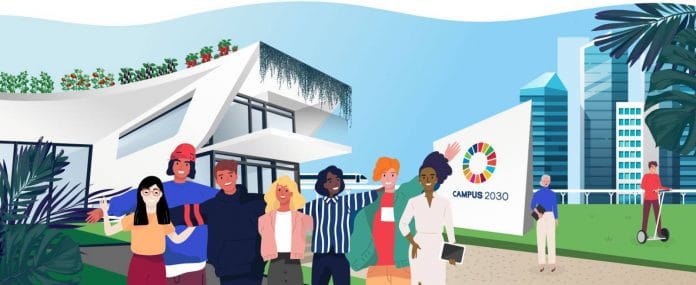Launched last October, the Challenge Campus 2030 will end on June 5 in a final between six international teams of students and teachers who will present their innovations for sustainable and inclusive campuses online in front of a jury.
The Challenge was organized by the Agence universitaire de la Francophonie (AUF) with the support of the United Nations Regional Information Centre (UNRIC) thanks to the French start-up Agorize, which specializes in open innovation.
Open to teams of students or teachers, or to mixed teams, the Challenge mobilized in its first phase of 283 teams or 1,351 participants, 50.2% of whom were women, of 97 nationalities and students in 87 different countries.
In order to participate, teams had to propose a project that had a direct impact on at least three of the 17 Sustainable Development Goals, in one of the following four themes:

After a first selection, made by a jury of experts from the United Nations and the AUF, thirty teams were called upon to further develop their projects. After a second selection phase, six projects prepared by six teams from six universities, made up of 23 students and teachers of 11 nationalities, will be presented during the final, which will take place by videoconference on 5 June:
BIOWAySTE (Balamand University, Lebanon) seeks to make university campuses greener by tackling the problem of solid waste.
Interdisciplinary Idea (Gadjah Mada University, Indonesia) presents their VIRDI project serving new alternatives by providing green spaces for mobile devices for university campuses in cities.
Les strasbourgeois (EM Strasbourg Business School, France) have developed a solution to reduce the feeling of insecurity on university campuses.
Plasma (State University of Campinas, Brazil) focuses on the development of interdisciplinary projects created by students under the guidance of professors and researchers in order to make SDG learning more effective.
R€cycler (University of Coimbria, Portugal) proposes solutions to promote and ensure recycling through a modest sum granted to students who recycle their waste.
We Learn We Lab (Egypt/Senghor University) aims to create a tool for the development and integration of “Lab” skills to facilitate learning, anticipate needs and provide sustainable and inclusive solutions for all.
These six teams will be accompanied by Sparknews, one of UNRIC’s partners, to prepare their final presentations. The final session will open with a round table discussion on the theme “How do universities contribute to achieving the SDGs and Agenda 2030? The teams will then present their projects and answer live questions from a jury of professionals representing the UN, AUF, Enactus, Groupe SOS and Impact Campus.
The grand final will be broadcast live on YouTube and on the AUF’s Facebook page between 14:00 and 17:00 (GMT+2).
The three best teams will win a week of “Learning Expedition” abroad offered by the AUF (valid for two people of the team: travel, training, professional meetings and accommodation).
Additional links:




